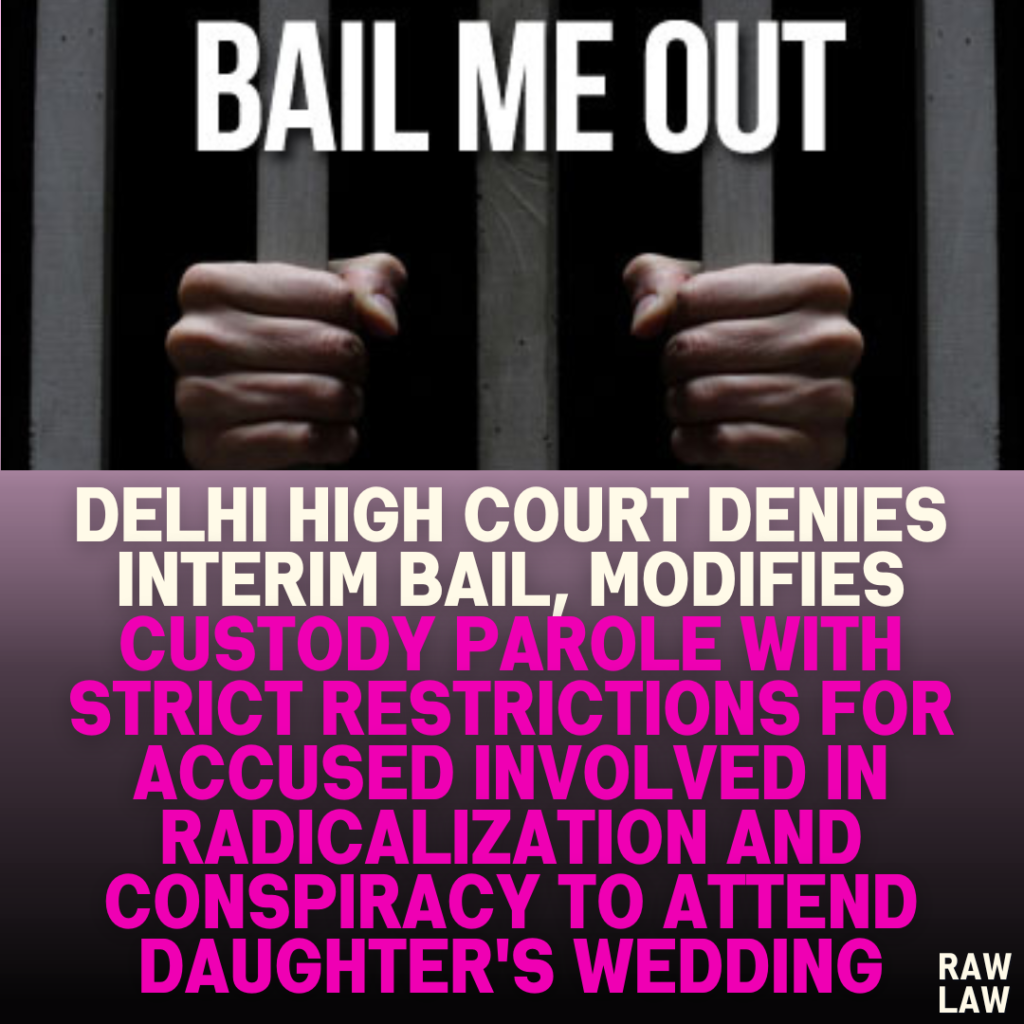Court’s Decision
The Delhi High Court, in its order dated 16th October 2024, rejected the appellant’s plea for interim bail and upheld the trial court’s decision to grant custody parole. However, the court modified the terms of the custody parole, extending it from 5th November to 13th November 2024, allowing eight hours of parole each day. The State was directed to bear the expenses of the parole, excluding air travel costs, which would have to be borne by the appellant if air travel was chosen.
Facts
The appellant, previously a senior leader of the Popular Front of India (PFI), had been arrested and charged under the Unlawful Activities (Prevention) Act (UAPA) and various sections of the Indian Penal Code (IPC) related to conspiracy and activities threatening national security. He sought interim bail to attend his daughter’s wedding in Coimbatore. The Special NIA Court had previously granted him custody parole for eight days, from 5th to 12th November 2024, to attend the wedding.
Issues
The main issue was whether the appellant, accused of serious offenses under the UAPA and IPC, should be granted interim bail or whether custody parole was sufficient to enable him to attend his daughter’s wedding.
Petitioner’s Arguments
The appellant argued that the custody parole granted by the trial court was insufficient and requested interim bail for 30 days to attend the wedding. He also expressed his inability to bear the costs associated with the custody parole and sought relief from those expenses.
Respondent’s Arguments
The National Investigation Agency (NIA) opposed the interim bail, citing the appellant’s past involvement with organizations such as SIMI and PFI, and the threat he posed due to his activities of recruiting and radicalizing Muslim youth. The NIA highlighted that there was a significant flight risk, given the nature of his alleged offenses. However, the NIA agreed that if the appellant could not bear the costs of custody parole, the State would cover the expenses.
Analysis of the Law
The court analyzed the provisions under the UAPA, specifically Section 43D(5), which restricts the grant of bail in cases where the allegations are prima facie true. The court noted that the appellant was facing serious charges related to national security and that granting interim bail could pose a threat due to his prior involvement with terrorist organizations.
Precedent Analysis
The court referred to several cases, including State Represented by National Investigation Agency vs. Saddam Hussain (2016), where it was held that the court’s discretion to grant bail under the UAPA is limited when there is a prima facie case against the accused. The court also cited Afzal Khan vs. State of Gujarat (2007), where the Supreme Court emphasized that bail should be denied in cases involving the security of the state.
Court’s Reasoning
The court reasoned that interim bail was not justified, given the nature of the charges against the appellant and the potential risk he posed. The court acknowledged the appellant’s desire to attend his daughter’s wedding but concluded that custody parole, with certain modifications, would sufficiently meet the appellant’s needs without compromising national security. The custody parole was thus extended by an additional day, with certain restrictions in place to prevent the appellant from interacting freely with wedding guests.
Conclusion
The court rejected the appellant’s plea for interim bail and upheld the custody parole granted by the trial court with minor modifications. The court emphasized the need to balance the appellant’s personal request with the serious nature of the charges against him, ensuring that proper security measures were in place during the custody parole period.
Implications
This judgment reaffirms the stringent application of UAPA provisions in cases involving national security. It underscores the judiciary’s reluctance to grant bail, even for personal reasons, in cases where the accused is charged with serious offenses related to terrorism and national security. The decision also highlights the court’s cautious approach in ensuring that any parole granted is subject to strict conditions to mitigate potential risks.



